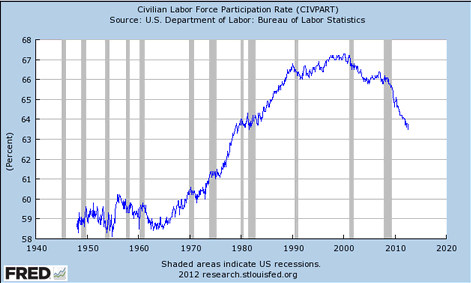Serious lack of aggregate demand.
Full FICA suspension still makes sense:
Labor force participation rate:


Serious lack of aggregate demand.
Full FICA suspension still makes sense:
Labor force participation rate:

He’s probably afraid of Draghi’s policies?
Or got long gold in his personal account, has his CB run it up for him to sell?
No telling!
Why is Putin stockpiling gold?
By Brett Arends
September 5 (WSJ) — I can’t imagine it means anything cheerful that Vladimir Putin, the Russian czar, is stockpiling gold as fast as he can get his hands on it.
According to the World Gold Council, Russia has more than doubled its gold reserves in the past five years. Putin has taken advantage of the financial crisis to build the world’s fifth-biggest gold pile in a handful of years, and is buying about half a billion dollars’ worth every month.
It emerged last month that financial gurus George Soros and John Paulson had also increased their bullion exposure, but it’s Putin that’s really caught my eye.
No one else in the world plays global power politics as ruthlessly as Russia’s chilling strongman, the man who effectively stole a Super Bowl ring from Bob Kraft, the owner of the New England Patriots, when they met in Russia some years ago.
Putin’s moves may matter to your finances, because there are two ways to look at gold.
On the one hand, it’s an investment that by most modern standards seems to make no sense. It generates no cash flow and serves no practical purpose. Warren Buffett has pointed out that we dig it out of one hole in the ground only to stick it in another, and anyone watching this from Mars would be very confused.
You can forget claims that it’s “real” money. There’s no such thing. Money is just an accounting device, a way of keeping track of how much each of us produces and consumes. Gold is a shiny and somewhat tacky looking metal that is malleable, durable and heavy. A recent research paper by Duke University’s Campbell Harvey and co-author Claude Erb raised serious questions about most of the arguments in favor of gold as an investment.
But there’s another way to look at gold: As the most liquid reserve in times of turmoil, or worse.
The big story of our era is not that the Spanish government is broke, nor is it that Paul Ryan apparently feels the need to embellish his running record. It’s that the United States, which has dominated the world’s economy for several lifetimes, is in relative decline.
As was first reported here in April of last year, according to International Monetary Fund calculations, the U.S. is on track to lose its status as the world’s biggest economy—when measured in real, purchasing-power terms—to China by 2017.
We will soon be the first people in two hundred years to live in a world not dominated by either Pax Americana or Pax Britannica. This sort of changing of the guard has never been peaceful. The declines of the Spanish, French and British empires were all accompanied by conflict. The decline of British hegemony was a leading cause of the First and Second World Wars.
What will happen as the U.S. loses its pre-eminence?
Maybe this will turn out better than similar episodes in the past. Maybe the Chinese will embrace an open society and the rule of law. If you believe that, there is probably no reason to hold any gold.